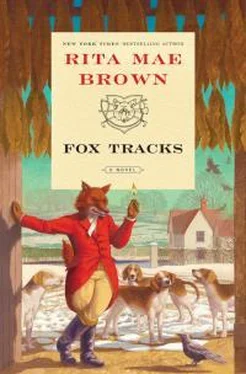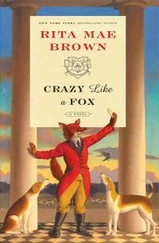“Okay. Now I am only repeating what she said. I’m not saying I believe it.” Outlaw began with that precautionary preamble. “Bitsy says the twelfth person hung there, Quincy Deyle—hung for rape—anyway, he told her there’s a killer in the hunt field.”
Hojo was highly skeptical. “How would he know if he’s hanging on the tree? Or whatever he’s doing?”
“Takes a crook to know a crook,” Outlaw said. “He raped a lady in 1778 and then strangled her.”
“Doesn’t make any sense. Why would you mate with a mare and then kill her?” Rickyroo, although gelded, as were all the boys, couldn’t understand such destructiveness.
“It’s a human thing,” said Iota.
The four companions babbled all the way to Little Dalby. When heading west, the crossroads at Chapel Cross was a key geographic spot in the Jefferson Hunt territory. Straight west once past Tattenhall Station, you passed Orchard Hill, then the Chapel itself. Going west, the Gulf Station was on your right, and then Old Paradise covered both sides of the tertiary road. Of course, the Jefferson Hunt could no longer hunt there.
Turning left at the crossroads, you came across some of Kasmir’s land. The mountains were close here. Then you passed Beveridge Hundred, still in good shape after all these years, and finally Little Dalby. No fixture was all that distant from any other, but the road left a lot to be desired. In a car, you might go thirty-five miles an hour. Hauling horses or hounds, that speed dropped to twenty-five, maybe thirty on a straightaway.
Passing through the gates to Little Dalby, the horses lifted their heads, a current of excitement running through them, as well as Betty and Sister in the truck cab. The modest old gates, so unlike Crawford’s estate, consisted of two fieldstone pillars, set wide apart. On top were brass crosses, for back in the eighteenth century, Little Dalby provided a refuge for Catholics. Even though Virginia’s James Madison was the first to write about separation of church and state, religious prejudice still existed.
As she pulled in to park on the well-drained flat field, Betty said, “I wish I knew the foxes better at Little Dalby.”
“No matter. They know us.” Sister smiled.
“I guess they do.” Betty checked out the trailers. “Don’t you like seeing people already here when we pull in?”
“I do. We’ve got a small contingent of Custis Hall girls. The afternoon classes girls. Donny’s here with one of Sybil’s horses, I see. How many do you count?”
“Nineteen. Not bad for a February sixteenth—cold, too.”
“Yeah, but everyone knows the season is closing in fast. We have one month left. Gotta get those hunts in.”
“And a lot know the foxes are mating, which makes for great runs.” Betty put on the emergency brake, even though the field was level. In a minute, the two women were out, wearing heavy bye-day tweed coats, a warm tie at their throats and each with a faded brown hunt cap—tails down, for they were staff—and brown field boots, a size too big, so they could wear extra socks.
Thin layers kept them warm more than one heavy layer. Keeping the torso warm wasn’t as difficult as those toes and fingers. Eventually, cold won out.
Moving off promptly at ten, the pack headed north, pale sunlight dispelling some of winter’s gloom. A northerly cast was a good choice because most of Little Dalby’s land ran from the house northward.
They jumped over coops, and had crossed two tidy pastures when the hounds feathered. Moving their tails vigorously, they surrounded a long row of large rolled hay bales. Mice like to make nests in the hay bales and foxes like to eat mice. A fox had hunted there, and not too long ago.
The pack, eighteen couples, opened all at once. They trotted, continuing north. They moved in a single line over the next fenced pasture, then took the coop before the mounted folks. Finally, as they crossed over a farm road they began running. The hounds blew through three fenced-in pastures, the fox scent sticking nicely to the slightly warming frosted earth. As the sun hit those fields, the temperature rose just enough for the scent to lift off the pastures, the fragrance burst full up in those magical hound noses.
By now, everyone was glad they’d put borium on the horses’ shoes or even screwed in studs. That helped horses grip in slippery footing, which it certainly was. Mud on top of frozen ground is worse, but a slowly thawing frozen field taught you to sit deep in that saddle.
The blinding pace already claimed some victims. Two riders couldn’t keep up, dropping back with Second Flight, who were running pretty hard as well. One of the Custis Hall girls, Emily Rogers, parted company with her horse at the last coop in the fence line.
The Custis Hall girls could ride, but most generally rode on flat surfaces. For a young person new to hunting, the big test was balance. Compared to what they faced now, it’s easy to be balanced on the flat.
Tears flowed from Sister’s eyes because of the cold and the pace. The hounds reached the end of Little Dalby, and leapt the Ha-Ha fence into Beveridge Hundred.
Trusting Rickyroo, she relaxed her hands, sank a little in the saddle and slid her leg just a tiny bit forward for insurance. Easy for the rangy Thoroughbred, the ditch was cleared, then Rickyroo hit the ground on the other side and, without taking a step, soared over the hedge.
Sister thought, Nice bounce jump .
Some behind her thought otherwise. Four people skidded into the ditch, misjudging the distance and the width. Two of them added insult to injury by overriding their horses. The horses, no dummies, hadn’t fallen to their knees or on their sides; they turned and started down the ditch. The riders laid flat on their horses’ necks because people behind were still taking the Ha-Ha fence. Once committed to a fence like that, a rider really couldn’t pull up. Not going for it could prove even more dangerous.
Once everyone was over, one of the riders tried to scramble out, but the bank caved in. She had no choice but to ride in the ditch.
Loath to waste time, Second Flight master Bobby Franklin stopped his horse down on the state road and called to the four to hurry up; they could get out down by the culvert.
At last, they scrambled from the ditch with difficulty. Bobby moved on. He hated to lose the First Flight. If they ducked into a woods or headed west into really thick woods, he’d have a devil of a time finding them until Shaker blew his horn. Best to keep them in sight.
On a vigorous hunt, one by one, the horses sorted out according to breed and conditioning. The best-conditioned Thoroughbreds stayed right up front. The appendix horses—half Thoroughbreds, half quarter horses—galloped with the forward group, often right behind the Thoroughbreds. The rest of First Flight hung about thirty yards behind, but today the gap was widening. One superb half draft horse blew along with the Thoroughbreds.
They crossed Beveridge Hundred in fifteen minutes, jumping mostly log jumps, solid and well set. Then they charged into the grounds of Old Paradise.
So far this had been an eight-mile point or run.
Roger, the fox, ran flat out over the frozen ground, which sparkled white and pink as sunlight touched the frost. The rolling hills created temperature systems all their own. He ran nine miles, ten miles, and then he and the pack as one cut sharply left, heading straight for the faded grandeur of Old Paradise itself.
In the distance, the massive barn came into view. Beyond that, the house’s white Corinthian columns glistened as the sun struck them.
Shaker—up with his hounds, Hojo having one of the best days of his equine life—couldn’t yell encouragement anymore. The cold made blowing on the horn nasty because his lips would stick. His voice was giving out, but no matter. The pack was all on.
Читать дальше












